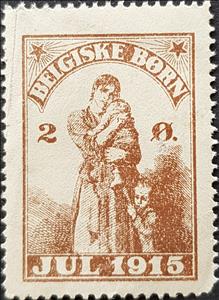Stamp: Belgiske Børn Jul 1915 (Denmark 1915)
Belgiske Børn Jul 1915 (Denmark 1915)
01 January (Denmark ) within release Belgian Children's Charity goes into circulation Stamp Belgiske Børn Jul 1915 face value 2 Danish øre
| Stamp Belgiske Børn Jul 1915 in catalogues | |
|---|---|
| Colnect codes: | Col: DK 1915 |
Stamp is vertical format.
Belgiske Børn Jul 1915Also in the issue Belgian Children's Charity:
- Stamp - Belgiske Børn Jul 1915 face value 2;
- Stamp - Belgiske Børn face value 10;
|
Data entry completed
83%
|
|
|---|---|
| Stamp Belgiske Børn Jul 1915 in digits | |
| Country: | Denmark |
| Date: | 1915-01-01 |
| Size: | 31 x 41 |
| Emission: | Cinderella |
| Format: | Stamp |
| Face Value: | 2 Danish øre |
Stamp Belgiske Børn Jul 1915 it reflects the thematic directions:
help, especially in the form of money, given freely to people who are in need, for example because they are ill, poor, or have no home, and organizations that provide this help: She does a lot of work for charity.
Biologically, a child (plural: children) is a human being between the stages of birth and puberty. The legal definition of child generally refers to a minor, otherwise known as a person younger than the age of majority. Child may also describe a relationship with a parent (such as sons and daughters of any age) or, metaphorically, an authority figure, or signify group membership in a clan, tribe, or religion; it can also signify being strongly affected by a specific time, place, or circumstance, as in "a child of nature" or "a child of the Sixties". There are many social issues that affect children, such as childhood education, bullying, child poverty, dysfunctional families, child labor, hunger, and child homelessness. Children can be raised by parents, by fosterers, guardians or partially raised in a day care center.
Christmas or Christmas Day (Old English: Crīstesmæsse, meaning "Christ's Mass") is an annual festival commemorating the birth of Jesus Christ, observed most commonly on December 25 as a religious and cultural celebration among billions of people around the world. A feast central to the Christian liturgical year, it is prepared for by the season of Advent or the Nativity Fast and initiates the season of Christmastide, which historically in the West lasts twelve days and culminates on Twelfth Night; in some traditions, Christmastide includes an Octave. The traditional Christmas narrative, the Nativity of Jesus, delineated in the New Testament says that Jesus was born in Bethlehem, in accordance with messianic prophecies; when Joseph and Mary arrived in the city, the inn had no room and so they were offered a stable where the Christ Child was soon born, with angels proclaiming this news to shepherds who then disseminated the message furthermore. Christmas Day is a public holiday in many of the world's nations, is celebrated religiously by the vast majority of Christians, as well as culturally by a number of non-Christian people, and is an integral part of the holiday season, while some Christian groups reject the celebration. In several countries, celebrating Christmas Eve on December 24 has the main focus rather than December 25, with gift-giving and sharing a traditional meal with the family.
Family (from Latin: familia) is a group of people related either by consanguinity (by recognized birth) or affinity (by marriage or other relationship). It forms the basis for social order. The purpose of the family is to maintain the well-being of its members and of society.[according to whom?] Ideally, families offer predictability, structure, and safety as members mature and learn to participate in the community. Historically, most human societies use family as the primary purpose of attachment, nurturance, and socialization




